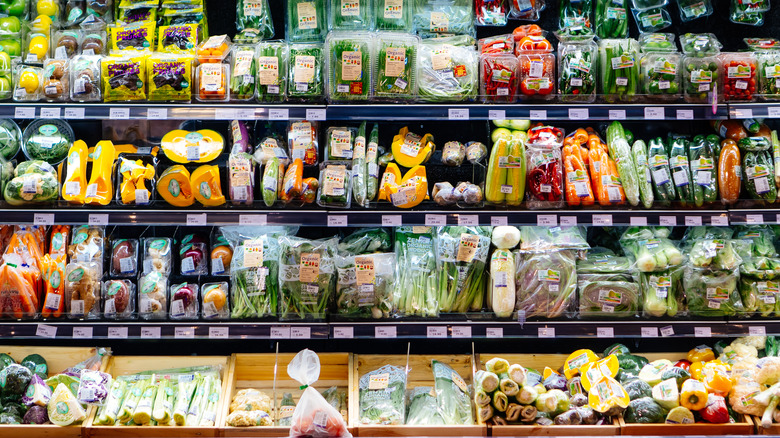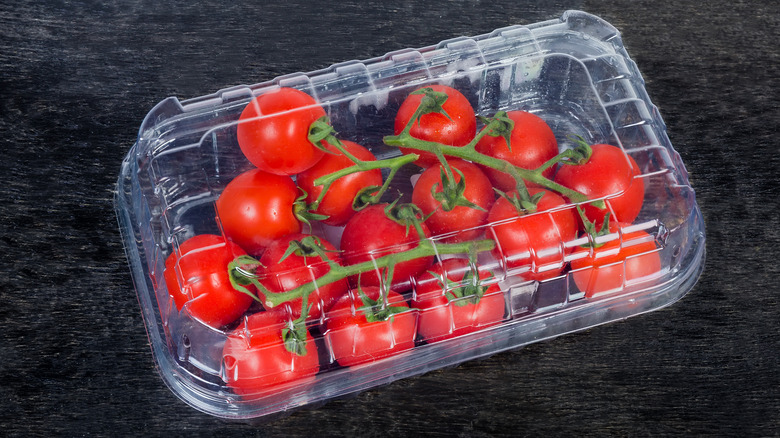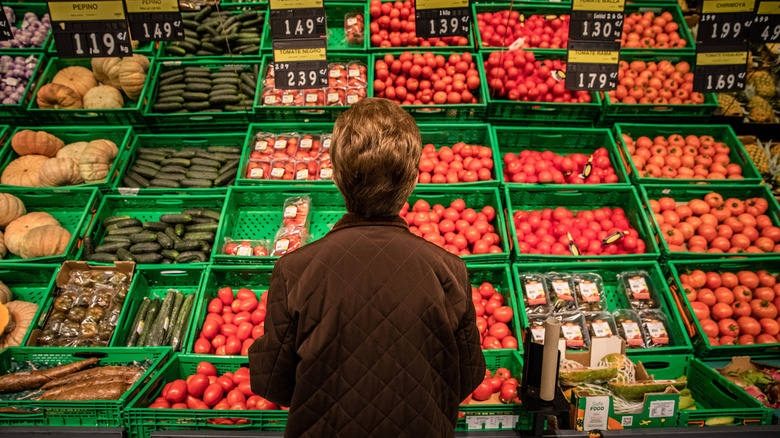There's A Big Problem With Produce Packaging According To New Study
Staggering amounts of fresh produce are being thrown out each year thanks to one unexpected source found in all major grocery stores: plastic packaging. According to The Guardian, a new study has found that single-use plastic wrappers used to package produce do nothing to prevent food spoilage, and are likely responsible for driving up waste.
The 18-month study, which was conducted by Wrap — a U.K. based advocacy group that works with businesses, governments, and people around the world to develop solutions for more sustainable resource uses — paints a grim image of the amount of food waste that may result from the use of this unsustainable form of packaging.
The study found that single-use packaging used for produce items contributes to the massive global issue of plastic pollution while potentially increasing the amount of edible produce that is thrown out every year. Throughout the study, Wrap monitored the lifespan of five popular forms of produce — apples, bananas, broccoli, cucumber, and potatoes — to assess whether or not plastic packaging helped extend their shelf life.
"We found that for most items, the plastic packaging they were sold in made little or no difference to their shelf life," said Marcus Gover, chief executive of Wrap. According to Gover, the most effective way of storing produce to extend its lifespan is "in the fridge at below five degrees, [which gives] days, weeks, and, in the case of apples, months more quality product life."
43 billion pounds of food waste are created each year
The study also found that the 'best-by' expiration dates included on most plastic packaging may encourage customers to throw out perfectly good produce before it has actually gone bad (via The Guardian). Plastic produce packaging also forces consumers to buy a set amount of a given fruit or vegetable, often leading to unused and discarded produce, which adds to the staggering 43 billion pounds of food waste produced every year (equivalent to 10% of all U.S. waste annually) according to SmartSense. 45% of all produce that enters the consumer supply chain is wasted each year.
On top of the human implications of discarding food that could otherwise be used to feed those without access to fresh produce, that staggering amount of food waste also poses a threat to the environment. According to the USDA, it is estimated that U.S. food waste embodies 170 million metric tons of carbon dioxide-equivalent emissions each year — equal to the annual CO2 emissions produced by over 40 coal-fired power plants.
In addition to compounding food waste, single use plastics in grocery stores contribute to the massive ecological issue of plastic pollution in the world's oceans. Some estimate that the amount of plastic trash flowing into seas could triple by 2040 without sweeping actions to curb plastic use (via National Geographic). Currently, over 14 million tons of plastic is dumped into the ocean each year, posing a huge threat to marine life, food safety, and the climate, reports the International Union for Conservation of Nature.
Environmental advocates are working to reduce the amount of plastic produce packaging
In an effort to reduce their overall environmental impact, some major grocery chains are pivoting towards reusable, single use plastic-free packaging, such as Kroger, which recently partnered with circular reuse platform Loop to implement a range of sustainably packaged products in a group of Portland-based stores. However, these reusable packaging solutions largely haven't extended to the produce aisle.
In the wake of the study, The Guardian reports Wrap hopes to work with Defra, the U.K.'s food standards agency, to develop nationwide solutions for reducing the amount of packaging used in the produce aisle, with the aim of all produce being sold loose by 2025. "This helps save the planet and us money at the same time," said Gover.
While groups like the Food Waste Reduction Alliance have been working to develop solutions for reducing food waste, without sweeping industry-wide changes to the ways in which produce is marketed, sold, and thrown out, the amount of plastic pollution and food waste will continue to grow unfettered in the years to come.


